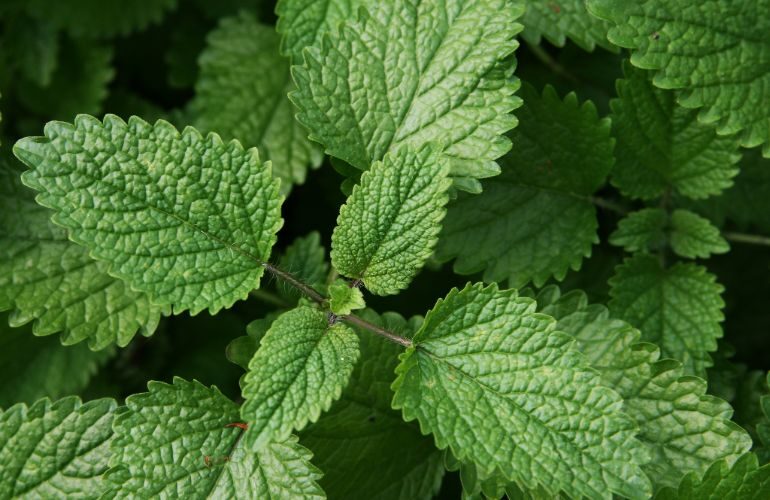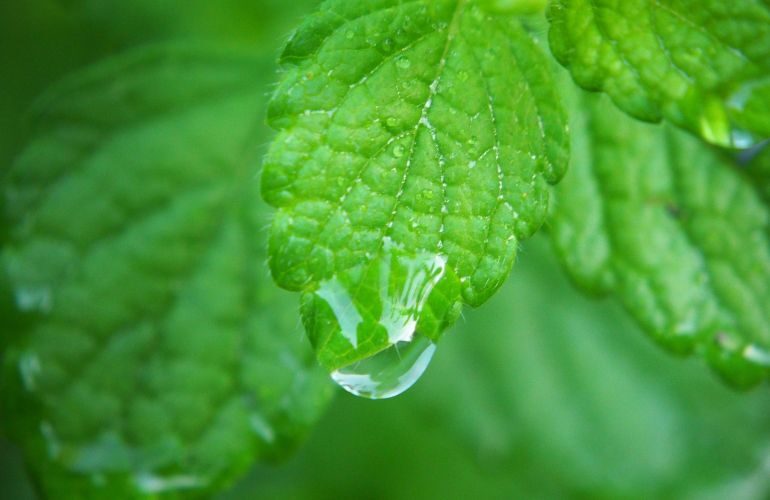Identification
Lemon Balm (Melissa officinalis) is a herbaceous perennial plant that belongs to the mint family. It has a square stem and grows up to 2 to 3 feet tall. The leaves are oval-shaped, slightly serrated, and have a distinct lemon scent. The leaves are usually a light green color and have a slightly wrinkled appearance.
To identify a Lemon Balm plant, look for the following characteristics:
- Square Stem: Lemon Balm has a square stem, which is a distinguishing feature of the mint family.
- Lemon Scent: Crush a few leaves in your hand and smell them. Lemon Balm has a distinct lemon scent, which is where it gets its name.
- Oval-Shaped Leaves: The leaves of Lemon Balm are oval-shaped, slightly serrated, and have a slightly wrinkled appearance. They are usually a light green color.
- Size: Lemon Balm can grow up to 2 to 3 feet tall.
- Flowering: Lemon Balm produces small, white or pale pink flowers in the summer months. The flowers are arranged in clusters on the stem.
Lemon Balm (Melissa officinalis) has been used for centuries for its medicinal properties. The plant contains a number of beneficial compounds, including volatile oils, flavonoids, and phenolic acids, which are responsible for its therapeutic effects. The following parts of the Lemon Balm plant are used for medicinal purposes:
- Leaves: The leaves of Lemon Balm are the most commonly used part of the plant for medicinal purposes. They are used to make teas, tinctures, and other preparations that are used for a variety of purposes, including promoting relaxation and reducing anxiety.
- Essential Oil: The essential oil of Lemon Balm is also used for medicinal purposes. It is used topically to treat cold sores and other viral infections, as well as to promote relaxation.
- Flowers: The flowers of Lemon Balm are also used for medicinal purposes. They are used to make teas and tinctures that are used to promote relaxation and reduce anxiety.
- Stem: The stem of Lemon Balm is not commonly used for medicinal purposes.
Common Name
Lemon Balm
Scientific Name
Melissa officinalis
Name in popular languages
- Spanish: Toronjil or Melisa
- French: Mélisse officinale
- German: Zitronenmelisse
- Italian: Melissa
- Portuguese: Erva-cidreira or Melissa
- Dutch: Citroenmelisse
- Swedish: Citronmeliss
- Danish: Citronmelisse
- Norwegian: Sitronmelisse
- Finnish: Sitruunamelissa
- Turkish: Limon otu
- Chinese: 柠檬香蜂草 or 柠檬香蜂花
- Japanese: レモンバーム or メリッサ
- Korean: 레몬밤 or 멜리사
- Russian: Мелисса лекарственная or Лимонная мята
- Greek: Μελισσόχορτο or Μελισσόφυλλο
- Persian: بومادران لیمویی or ملیسا
- Arabic: عشبة الليمون or المليسة
- Hindi: नींबू बाल्म or लेमन बाम
- Bengali: লেমন বম
- Tamil: எலுமிச்சை கற்பூரவள்ளி
- Telugu: లెమన్ బామ్ or నింబువానకం
- Kannada: ಲೆಮನ್ ಬಾಮ್
- Malayalam: ലെമൺ ബാം or എലുവാനപ്പന്
- Gujarati: લેમન બામ or નિંબુનો બામ
- Marathi: लेमन बाम or निंबूचा पान
- Punjabi: ਲੈਮਨ ਬਾਮ or ਨਿੰਬੂ ਦੀ ਪੱਤੀ
- Urdu: نیبو کا پتا or لیمون بالم
Origin and History
Lemon Balm (Melissa officinalis) is a perennial herb that is native to the Mediterranean region, including parts of Europe, Asia, and North Africa. It has been used for medicinal purposes for thousands of years.
The ancient Greeks and Romans were among the first to use Lemon Balm for its medicinal properties. The herb was considered to be a symbol of good health and longevity, and was often used to treat a variety of conditions, including digestive disorders, insomnia, and anxiety.
In the Middle Ages, Lemon Balm was widely used throughout Europe as a remedy for the plague, which was a deadly infectious disease that killed millions of people. The herb was also used to treat other infectious diseases, including colds, flu, and fevers.
During the Renaissance period, Lemon Balm was used to treat a variety of mental health conditions, including depression and anxiety. The herb was also used to promote relaxation and improve cognitive function.
In modern times, Lemon Balm is still used for its medicinal properties. The herb is often used to treat anxiety, insomnia, depression, and digestive disorders. It is also used to promote relaxation and improve cognitive function.
Overall, Lemon Balm has a long history of use for health and medicinal purposes, and continues to be a popular herb for its therapeutic benefits.
Nutritional constituents
Lemon Balm (Melissa officinalis) is a herb that is rich in several nutritional and bioactive compounds. Here are some of the main constituents of Lemon Balm:
- Essential oils: Lemon Balm contains a high concentration of essential oils, which are responsible for its characteristic lemony scent and flavor. The main constituents of Lemon Balm essential oil include citronellal, geranial, neral, and citral. These compounds have been shown to have antimicrobial, antiviral, and antioxidant properties.
- Polyphenols: Lemon Balm contains several polyphenols, which are bioactive compounds that have antioxidant and anti-inflammatory properties. The main polyphenols in Lemon Balm include rosmarinic acid, caffeic acid, and quercetin. These compounds have been shown to have a wide range of health benefits, including protecting against oxidative stress, reducing inflammation, and improving cognitive function.
- Flavonoids: Lemon Balm contains several flavonoids, which are bioactive compounds that have antioxidant and anti-inflammatory properties. The main flavonoids in Lemon Balm include luteolin and apigenin. These compounds have been shown to have a range of health benefits, including protecting against oxidative stress, reducing inflammation, and promoting relaxation.
- Vitamins and minerals: Lemon Balm contains several vitamins and minerals, including vitamin C, vitamin A, calcium, and magnesium. These nutrients are important for overall health and can help support immune function, bone health, and muscle function.
Medicinal or Health Benefits
Lemon Balm (Melissa officinalis) has a long history of use for medicinal purposes. Here are some of the potential health benefits of Lemon Balm:
- Reducing anxiety and improving mood: Lemon Balm has been shown to have anxiolytic effects, which means it may help reduce anxiety and improve mood. One study found that a combination of Lemon Balm and Valerian root reduced anxiety and improved mood in a group of healthy volunteers.
- Improving sleep: Lemon Balm has been shown to improve sleep quality and duration. One study found that a combination of Lemon Balm and Valerian root improved sleep quality and reduced the time it took to fall asleep in a group of people with insomnia.
- Enhancing cognitive function: Lemon Balm has been shown to improve cognitive function, including memory and attention. One study found that a single dose of Lemon Balm extract improved cognitive performance in a group of healthy volunteers.
- Reducing stress and improving resilience: Lemon Balm has been shown to have stress-reducing effects and may improve resilience to stress. One study found that a combination of Lemon Balm and Rhodiola rosea reduced symptoms of stress and improved mood in a group of healthy volunteers.
- Supporting digestive health: Lemon Balm has been traditionally used to support digestive health, and some studies suggest it may have anti-inflammatory and antimicrobial effects in the gut. One study found that Lemon Balm extract reduced symptoms of dyspepsia, including bloating and indigestion, in a group of people with functional dyspepsia.
Scientific Perspective
Here are some scientific studies on the use of Lemon Balm (Melissa officinalis) for health and medicinal purposes:
- Gastrointestinal disorders: One randomized controlled trial found that Lemon Balm extract significantly improved symptoms of dyspepsia, including bloating and stomach pain, compared to placebo. Another study found that Lemon Balm extract reduced the severity of colitis in rats by decreasing inflammation.
- Anxiety and depression: One study found that a combination of Lemon Balm and Valerian root significantly reduced symptoms of anxiety and depression in healthy volunteers. Another study found that Lemon Balm extract improved mood and cognitive performance in elderly patients with mild-to-moderate Alzheimer’s disease.
- Sleep disorders: One study found that a combination of Lemon Balm and Valerian root improved sleep quality and reduced the time it took to fall asleep in patients with insomnia.
- Pain relief: One study found that Lemon Balm extract reduced pain and improved functional ability in patients with chronic low back pain.
- Antimicrobial activity: Several studies have found that Lemon Balm extract has antimicrobial activity against a range of microorganisms, including bacteria, fungi, and viruses.
FDA's perspective
The FDA has not approved lemon balm as a drug for any specific medical condition. However, lemon balm is generally recognized as safe (GRAS) by the FDA and is commonly used as a dietary supplement.
It is important to note that the FDA does not regulate dietary supplements in the same way it regulates drugs. Therefore, the quality, safety, and effectiveness of lemon balm supplements may vary. It is recommended to consult a healthcare professional before using lemon balm or any other dietary supplement for medicinal purposes.





